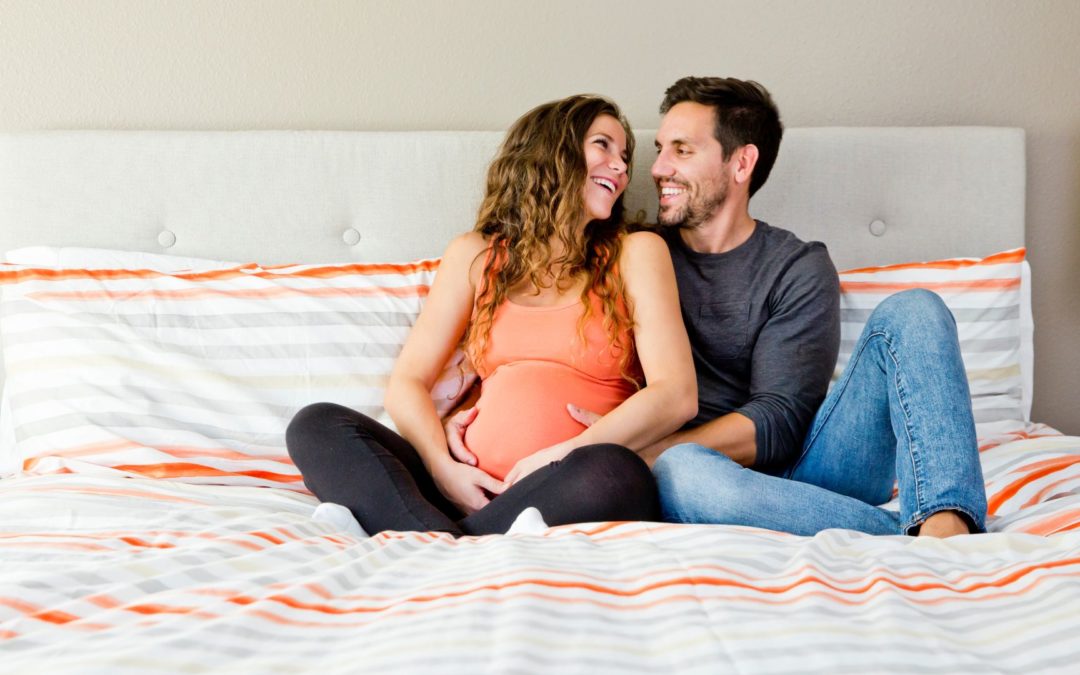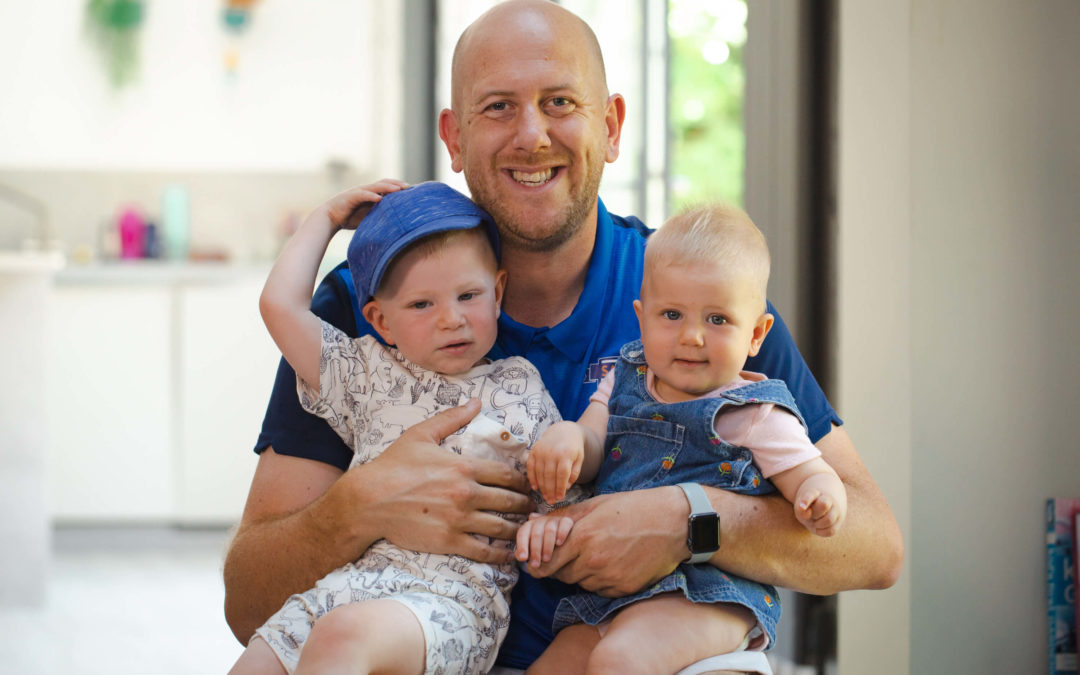Q: What can I do during pregnancy?
A: Men often feel a little distanced in pregnancy, as it is not something they are personally experiencing. However, there is lots you can do, for your partner, your baby and yourself!
Every woman experiences pregnancy differently, and need support with different things, so listen to how she is feeling and see where you can be most useful. Pregnancy complications
Attend as many antenatal appointments, scans and classes as you reasonable can to show your support and gain an understanding about what is happening. Scans what to expect
Take the time to start to bond with your baby before they arrive – your baby will be bonding with your during pregnancy as they learn to recognise your voice and even your favourite TV show! Take time to get to know them too, before the arrive Dads and Bonding
Pregnancy is a great time to start preparing for your role of birth partner as well as that of fatherhood. Sign up for antenatal classes and start preparing for when you will need to be very involved and hands on! Antenatal classes, what are they?
Q: Is it really possible that I might also get pregnancy symptoms or sympathy pains?
A: It is possible. The official name for this is Couvade syndrome, and it is also known as sympathetic pregnancy. Dads-to-be can experience a range of similar symptoms including bloating, nausea, back pain, and cravings!
It is not exactly known what causes this to happen, and a range of possible causes are still being considered. Men’s hormone levels do change during pregnancy and birth in response to becoming a father, so it is also possible this is linked somehow.
Couvade syndrome is usually short term with no additional complications. Pregnancy complications
Q. Our pregnancy was planned so I expected to be feeling excited and happy, but I’m feeling a lot of uncertainty and worry… What’s wrong?
A. Nothing is wrong, it is completely normal to have very mixed feelings when you discover you are pregnant. The reality that you are going to be a dad is a major life changing event, and with it almost always come a variety of feeling and fears. These will change over time, so don’t worry too much about them and be assured that the majority of dads feels like this at some point and still go on to be fantastic fathers who love fatherhood! Am I ready to be a dad?
Q. Is it ok for me to attend antenatal appointments with my partner?
A. Of course, as long as your partner is also happy for you to be there! This is your baby too and you are also entitled to information and support regarding the pregnancy. What can a dad expect from a good maternity service?
Attending appointments is also a way of supporting your partner – scans and appointments are often positive experiences, but occasionally there might be a problem or a decision to be made. Antenatal tests and checks
Since October 2014, Fathers and partners have the right to take unpaid time off work to accompany expectant mothers to up to 2 antenatal appointments, which include scans.
If you wish to attend more than 2 antenatal appointments then you still have other choices. Talk to your employer about taking additional unpaid leave, or even consider using annual leave where necessary.
Dads rights.
Q: My partner is really frightened about giving birth. What can I do to help her?
A: It is great that you recognise how your partner feels, and the most important thing you can do is be there to listen to her, and to reassure her.
It may be very helpful to do some antenatal classes which are specifically designed to support her to feel more calm and confident about birth. Antenatal classes: what are they?
If you plan to be at the birth, make sure know what will be happening and how you can help – the more confident you are in knowing how to support her, this will help ease her anxiety. what do I do when she goes into labour?
Make sure you both talk about the birth and write a birth plan, which may give her a better sense of control and understanding about what will happen Birth plans, what are they?
Q: I’m nervous about taking care of our baby, especially being left on my own with them. Will this pass or will I always feel like this while they are so little?
A: Whether you are a mum or a dad, it is not unusual to feel a bit anxious about looking after a new baby, especially if you have not been around babies a lot before. It is common to worry about whether we will be gentle enough, whether we will be able to work out why they are crying, and so on.
To some extent, yes the feelings will pass, especially if you throw yourself in to caring for your baby. The more hands on you get, the quicker you will learn all about them and how to care for them and with that comes confidence. Baby’s home: what next?
However, anxiety can still linger for some dads, so it can be a good idea to do some preparation to help you feel more confident about life with a baby in advance of their arrival. Attend an antenatal class specifically focused on baby care skills in your area, to get hands on practice in how to change a nappy, wind your baby and even bathe them, all before they have arrived!
What goes on at an antenatal class?
Q. My wife wants to give birth at home, is it safe?
A. It isn’t unusual for dads to feel a bit uneasy at the idea of a homebirth, especially as the vast majority of births in the UK take place in hospital. However, researching where to have your baby is time well spent, as the evidence shows that birthing at home is as safe as in hospital births and has lower rates of interventions. Where should we give birth?
You might also find it useful to see if your local hospital has a homebirth team, or whether there is a homebirth group which meets in your area, as this would give you the opportunity to find out more and ask any questions. Where you choose to give birth forms a key part of your birth plan Birth Plans What are they?
Q. My partner wants her mum to be at the birth as well as me, but I’m worried about being pushed out. What should I do?
A. Deciding who will be the birth partner is a key part of the birth plan, and it is important that your partner has a person or people who she feels will enable her to feel as relaxed and cared for as possible. Birth plans what are they?
In all things, communication is important. Talk to your partner about birth partners and find out why she has a preference for having two birth partners. Is there something she specifically wants from her mum which you can’t provide? If so, then it might be a case of respecting her wishes but working out how you can make it work between yourselves.
However, if you can show her that you are taking the role of birth partner seriously and are specifically preparing for it, she may reassess this. Should I be at the birth?
Sometimes our partners worry that the birth will be difficult for us, and so ask other people to also be there to take some of the pressure off. If this is something which you think could be a potential reason for her choice, discuss this with your partner.
Ultimately, your partner does need to feel comfortable that she has the best support around her, as this will make her birth easier, so sometimes this does mean that we have to put her wishes before our own. We will always be our baby’s dad though, and that is a connection which is unique regardless of who else may be at the birth.
Q. How do I know when it is time to take my partner to hospital in labour? I’m worried about getting it wrong and either going in stupidly early, or far too late with the baby being born in the passenger seat on the way!
A. This is a common question, as many expectant dads worry about these exact scenarios – so you are definitely not alone in thinking about these possibilities!
There are several signs for when it is time to make the trip to hospital which it would be useful to familiarise yourself with in advance How do I know she is in labour?
To reassure you, you are far more likely to arrive at the hospital/call the midwife out in loads of time than have an unexpected home birth, although without doubt it does happen occasionally. Here is the lowdown on what to do if it did happen Mr Midwife
If you do go into hospital too early, then it will just be suggested that you go home for a while longer – no one will think you or your partner are silly, this happens all the time. After all it is hard to know when it is the right time, especially when it is your first baby and you have never done this before!
Q. Is giving birth really as bad as it looks on TV?
A. Even though most first time parents-to-be have not seen anyone give birth in real life, we have images in our mind of what it will be like, full of screams, groans and drama.
A lot of this we get from TV, and it is important to remember that what we see there, even on documentaries, is not always representative of real life. All programmes depicting birth, even when they are documentary dramas, are specifically selected and edited to make them appeal to and pull in viewers.
The reality is that the experience of labour and birth varies tremendously from one woman to the next. Preparation is an important part of making this experience as positive as possible, which is why researching your birth plan is very important, as is attending good antenatal education classes.
Birth plans what are they?
What goes on at an antenatal class?
While your partner is pregnant, it might be a good idea to think about what you watch on TV regarding birth. There is no saying that the birth of your baby will be anything like the drama of television – so if watching these programmes make you feel anxious or uncomfortable – don’t!
Q. What’s the best form of pain relief?
A. There are lots of choices about how to minimise or cope with labour pain, from things which can easily be done at home, to drugs which need to be administered in a hospital (and a lot more in between!) Pain relief at the birth
It is impossible to say which is best, as it depends on the individual woman and how she experiences labour. Some women may not feel the need for any pain relief, while other women do want it.
It also depends on what kind of birth you would like to have, as some types of pain relief can impact on birth choices. You can explore this when you are writing your birth plan Birth Plans what are they?
Q. Do I have to be at the birth?
A. No, it isn’t an obligation. Over 90% of fathers are now at the birth of their child but for some guys, for various reasons, it just isn’t for them. Should I be at the birth?
If you are concerned about being there, it is helpful to think through the reasons why, in case they are hurdles which can be overcome. If the reasons relates in some way to worries about not knowing what to do, or how to do it, that is something which can be learnt and you might find you change your mind as your confidence in yourself and your role develops.
Helping at the birth: what can you do?
Antenatal classes: what are they about?
Talk to your partner and discuss how you feel. It is important that she has support for the birth, and who will be her birth partner is a key choice on the birth plan, so if it isn’t going to be you, you need to explore other options.
Birth plans what are they?
Q. Do I have to cut the cord? What is it like? What happens if I don’t?
A. Who cuts the cord is a choice, you do not have to do it.
Your partner could do it herself, another birth partner or the midwife herself.
If you are undecided, you can always keep the option open and see how you feel at the time – just pop it on your birth plan that you would like to be given the option of cutting the cord. Birth plans what are they?
Rest assured, neither your partner nor baby will feel anything as it is cut, as there are no nerve endings in the cord. A pair of surgical scissors is used, and the midwife will guide you through it, showing you exactly where to cut.








